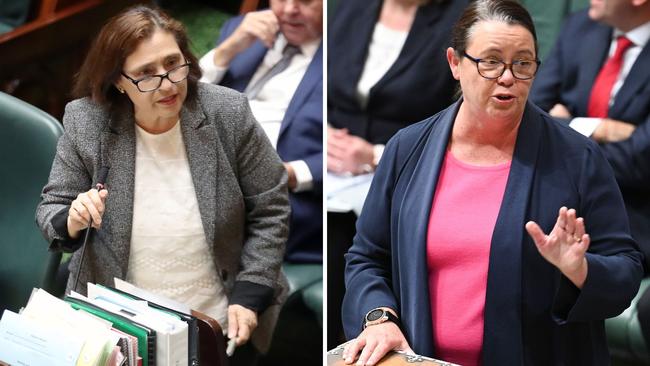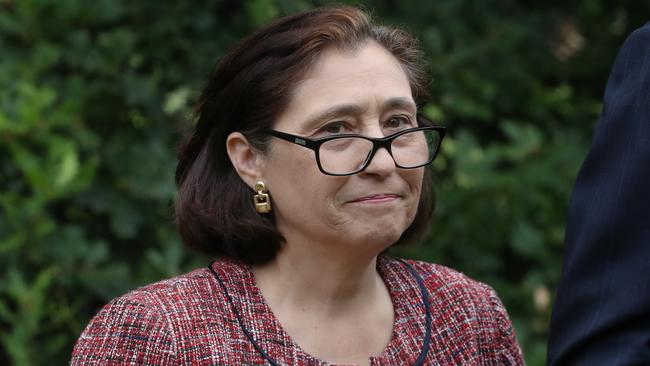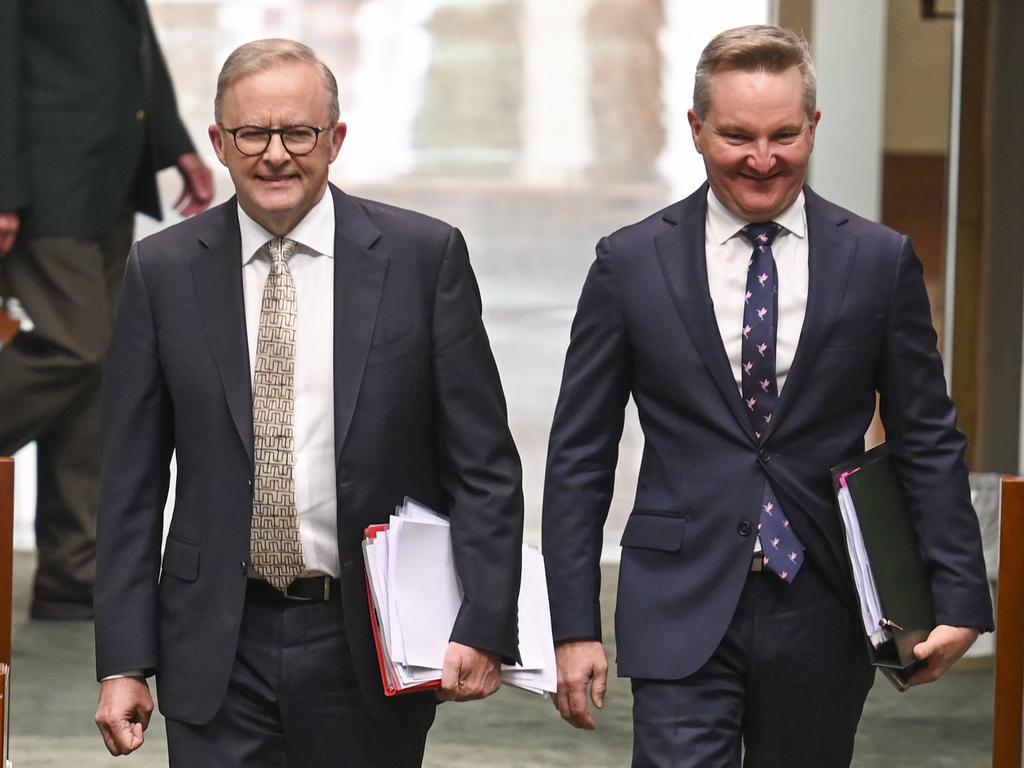Bowen’s department pays consultants for advice on ‘Victoria’s energy shortage’
The federal Department of Climate Change, Energy, Environment and Water has awarded a taxpayer-funded contract to consultants to advise them on the state’s ‘forecast electricity supply shortfall’.

The federal Department of Climate Change, Energy, the Environment and Water has awarded a taxpayer-funded contract to Melbourne-based consultants to advise them on “options to address Victoria’s forecast electricity supply shortfall.”
While the Department has told The Weekend Australian the six month, $183,000 contract awarded to ACIL Allen consultants in January relates to the Marinus Link cable being built between Tasmania and Victoria, the company’s brief, listed on the federal government’s AusTender website, makes no mention of Marinus.
The contract was awarded months after the Australian Energy Market Operator warned in its annual Energy Statement of Opportunities that Victoria and South Australia were facing an increased risk of blackouts, urging governments to plug the supply shortage or face a decade where power supplies cannot be guaranteed.
News of its existence came as a war of words broke out on Friday between Victoria’s Energy Minister and her federal Labor Resources Minister counterpart, with Lily D’Ambrosio accusing Madeleine King of sounding “like a Coalition minister” on the issue of gas supply.
The stoush follows the ACCC on Friday warning NSW and Victoria will face gas shortages this winter, unless extra supplies can be shipped south from Queensland.
“The southern states are expected to need an additional 25 PJ (petajoules) of supply to avoid a shortfall in quarter 3 2024. This will need to be withdrawn from storage or be transported from Queensland or the Northern Territory to the southern states,“ the competition watchdog’s report warned.

Responding to the ACCC’s findings on ABC radio on Friday morning, Ms King said: “There is no doubt Queensland is doing the heavy lifting in terms of gas supply for the whole of the east coast.”
“Now, I’m not interested in criticising decisions of state governments. They make their choices. What I would say is that Queensland is doing the heavy lifting. But any gas you transport from long distances, like from far north Queensland in Gladstone, all the way down to Melbourne or the industrial estates of Victoria, it costs more money to get hold of that gas because you’ve got to move it through a pipeline. Or if the import terminals end up eventuating, you’ve got to freeze the gas and defrost the gas and transport the gas,” the Resources Minister said.
Ms King also said her government had made reforms to mitigate the possibility of a gas crisis, including ensuring the Iona gas storage facility, near Port Campbell in Victoria, is “up and running to a much better capacity than it was before.”
A short time later, Ms D’Ambrosio hit back on the social media platform X, formerly known as Twitter, tweeting: “So @MadeleineMHKing is more like a Coalition Minister on radio this morning. How about talking the facts: 1. Qld gas is not doing ‘the heavy lifting’ as it remains a nett importer of Vic gas 2. There is no ban on Vic onshore con. gas exploration. And Vic fixed Iona – not you.”
So @MadeleineMHKing is more like a Coalition Minister on radio this morning. How about talking the facts: 1. Qld gas is not doing ‘the heavy lifting’ as it remains a nett importer of Vic gas 2. There is no ban on Vic onshore con. gas exploration. And Vic fixed Iona - not you
— Lily D'Ambrosio MP (@LilyDAmbrosioMP) April 4, 2024
AEMO’s Victorian Gas Planning Report for 2024 indicates that Ms King is correct that Queensland is “doing the heavy lifting in terms of gas supply for the whole of the east coast”, as a net exporter of gas to the southern states, particularly during the winter peak, which saw Victoria become a net importer during the third quarter of 2023.
However, Ms D’Ambrosio is correct that over the course of a calendar year, Victoria is currently a net exporter of gas to other states, predominantly NSW.
Victoria’s Coalition government placed a moratorium over all onshore gas exploration in 2012, and the Andrews Labor government maintained it until June 2020, passing legislation in 2017 which has permanently banned all fracking and coal seam gas extraction.
In July 2021, Victoria’s onshore conventional gas sector restarted, but warnings persist of a looming gas shortfall in Victoria, with AEMO last month attributing the problem to a lack of investment in new supply after the state government created an “uncertain investment environment.”
Federal Energy Minister Chris Bowen’s office referred questions regarding the ACIL Allen contract to the department, which said it had engaged the company “to model scenario outcomes related to the $3bn -$3.3bn Marinus Link project.”
“The work was commissioned by the government as part of the Commonwealth’s due diligence process given the size and importance of Marinus Link for the Tasmanian, Victorian and National Energy Markets,” the department said.
Opposition energy spokesman Ted O’Brien said the contract “exposes the duplicity of Labor, it boasts success at the shop front while constantly mopping up failure behind the counter.”
“The truth is that Labor hates gas and its anti-gas policies are creating shortfalls which heightens prices and threatens blackouts while compromising our energy security,” Mr O’Brien said.
“The Prime Minister is too weak to tell Chris Bowen and Lily D’Ambrosio to stop killing gas and so taxpayers are now being asked to pay for external consultants to mop up the mess of their failed ideological crusade against the fuel.”
“News that Chris Bowen is putting his hand out two years into government for external help to address looming energy shortfalls in Victoria is a concession that Labor has completely lost control of Australia’s energy market and has no ideas of its own to regain control.”
A spokeswoman for Ms D’Ambrosio said Victoria had “more than tripled its share of renewable energy since 2014 and with a strong pipeline of future projects and reduced red tape providing greater investment certainty with our new streamlined planning approval process Victorians can expect more renewable energy and cheaper bills into the future.”
Victorian opposition energy spokesman David Davis said of Ms D’Ambrosio’s tweet: “D’Ambrosio’s intemperate response is a window into the fact that ideology is driving the Victorian government, not practical solutions about supply, reliability and cost.”








To join the conversation, please log in. Don't have an account? Register
Join the conversation, you are commenting as Logout